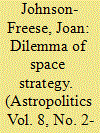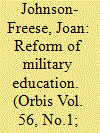| Srl | Item |
| 1 |
ID:
105601


|
|
|
| 2 |
ID:
123290


|
|
|
|
|
| Publication |
2013.
|
| Summary/Abstract |
There are 54 countries on the African continent, but only one has managed to elect a woman, Ellen Johnson Sirleaf in Liberia, as chief executive. While African countries face unique issues, there is a common thread in the struggles of female politicians in male-dominated, traditional societies. The case of Joyce Banda, the President of Malawi, is illustrative.
|
|
|
|
|
|
|
|
|
|
|
|
|
|
|
|
| 3 |
ID:
101223


|
|
|
| 4 |
ID:
188144


|
|
|
|
|
| Summary/Abstract |
To demonstrate why a more feminist approach offers potentially greater success than the more masculine approaches already tried, and failed, this article provides a case study of US deterrence strategy toward Iran during the most recent presidential administrations—two Democratic and two Republican. Analysis will focus on whether each administration’s stance toward Iran has been traditionally masculine, feminine, or a mix. From that examination, recommendations are made regarding development of effective US-Iranian deterrence strategy in the future.
|
|
|
|
|
|
|
|
|
|
|
|
|
|
|
|
| 5 |
ID:
074785


|
|
|
|
|
| Publication |
2006.
|
| Summary/Abstract |
Since the late 1990's the United States has maintained a strict policy of no cooperation with China on space activities. The reasons for that are several, including the desire to inhibit the development of dual-use technology considered potentially threatening to the United States and political reluctance to work with a communist country. Increasingly, however, it has become clear that policy is not constraining China from dual-use technology development and that the policy overall may be detrimental to U.S. security interests. Therefore a policy change, from a realistic consideration of circumstances, must be considered.
|
|
|
|
|
|
|
|
|
|
|
|
|
|
|
|
| 6 |
ID:
110164


|
|
|
|
|
| Publication |
2012.
|
| Summary/Abstract |
When considering how to make the war colleges more effective, it should be remembered that first and foremost, the job of the war colleges is to educate students to make them better defenders of the United States of America and its interests and its allies around the world. However, the author gives many recommendations on how these colleges can better educate, rather than train.
It has been 25 years since the landmark 1986 Goldwater-Nichols Act reformed U.S. national defense. Part of that important legislation specifically mandated guidelines for military education, with intent to open the military culture and to encourage intellectual integration with civilians and among the services themselves. This was followed by the "Skelton Panel," chaired by Rep. Ike Skelton (D-MO). The idea behind both was simple, reflecting the classic wisdom that "the society that separates its scholars from its warriors will have its thinking done by cowards and its fighting done by fools.1 "Over a decade earlier, Admiral Stansfield Turner had similarly reformed the Naval War College (NWC), warning that if military officers could not hold their own with the best civilian strategists, the military would end up "abdicating control over its profession."
In 2010 the House Armed Service Committee issued a report titled Another Crossroads? Profession
|
|
|
|
|
|
|
|
|
|
|
|
|
|
|
|
| 7 |
ID:
058024


|
|
|
| 8 |
ID:
059936


|
|
|
| 9 |
ID:
078337


|
|
|
|
|
| Publication |
New York, Columbia University Press, 2007.
|
| Description |
xii, 304p.
|
| Standard Number |
9780231136549
|
|
|
|
|
|
|
|
|
|
|
|
Copies: C:1/I:0,R:0,Q:0
Circulation
| Accession# | Call# | Current Location | Status | Policy | Location |
| 052534 | 358.8/JOH 052534 | Main | On Shelf | General | |
|
|
|
|
| 10 |
ID:
052621


|
|
|
| 11 |
ID:
001167


|
|
|
|
|
| Publication |
Westport, Praeger, 1997.
|
| Description |
xx,277p.Hardbound
|
| Standard Number |
0275958816
|
|
|
|
|
|
|
|
|
|
|
|
Copies: C:1/I:0,R:0,Q:0
Circulation
| Accession# | Call# | Current Location | Status | Policy | Location |
| 040716 | 387.80973/JOH 040716 | Main | On Shelf | General | |
|
|
|
|
| 12 |
ID:
081320


|
|
|
|
|
| Publication |
2008.
|
| Summary/Abstract |
The Chinese ASAT test resulted in a kill to a derelict satellite and the production of a debris field that now threatens other satellites in low earth orbit. More importantly, this event crossed a potentially dangerous threshold in the "weaponization" of space. Space assets are now perceived as more vulnerable than ever to direct attack or from accidental damage from orbital debris. This article focuses on the U.S. military response to the Chinese ASAT test. The U.S. military has three basic perspectives from which to react to ths test. First, it can prepare to act offensively to eliminate threats. Secondly, it can choose to develop and field defensive systems. Finally, it can engage in space security cooperation to protect U.S. and international space-based assets and defuse an arms race. The direction the U.S. military takes will ultimately be a function of larger U.S. government policy and national security decisions. On the eve of the election of a new U.S. administration, we find ourselves at a strategic crossroads concerning the protection of our interests in space. The road we take may have far-reaching implications and consequences. It is in our best national security interests to tread carefully and get it right
|
|
|
|
|
|
|
|
|
|
|
|
|
|
|
|